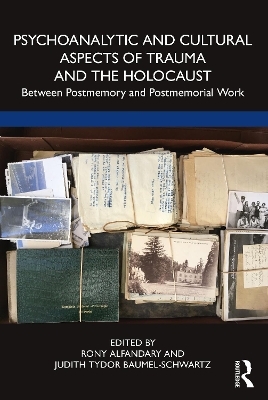
Psychoanalytic and Cultural Aspects of Trauma and the Holocaust
Routledge (Verlag)
978-1-032-22889-1 (ISBN)
Psychoanalytic and Cultural Aspects of Trauma and the Holocaust presents interdisciplinary postmemorial endeavors of second-, third- and fourth-generation Holocaust survivors living in Israel and in the Jewish diaspora.
Drawing on a wide range of fields, including psychoanalysis, Holocaust studies, journal and memoir writing, hermeneutics, and the arts, this book considers how individuals dealing with the memory, or postmemory, of the Holocaust possess a personal connection to this trauma. Exploring their role as testimony bearers, each contributor performs their postmemorial work in a unique and creative way, blending the subjective and the objective. The book considers themes including postcolonialism, home, displacement, and identity.
Psychoanalytic and Cultural Aspects of Trauma and the Holocaust will be key reading for academics and students of psychoanalytic studies, Holocaust studies, and trauma and cultural studies. It will also be of interest to psychoanalysts working with transgenerational trauma.
Rony Alfandary, Ph.D., is a clinical social worker, psychoanalytic psychotherapist, and photographer. He is a lecturer at the School of Social Work at the University of Haifa and the former director of the Post-Graduate Program of Psychoanalytic Psychotherapy at Bar-Ilan University, Israel. His recent publications include Exile and Return: A Psychoanalytic Study of Lawrence Durrell’s The Alexandria Quartet and Postmemory, Psychoanalysis and Holocaust Ghosts: The Salonica Cohen Family and Trauma across Generations, both published by Routledge. Professor Judith Tydor Baumel-Schwartz is the director of the Arnold and Leona Finkler Institute of Holocaust Research, the Abraham and Edita Spiegel family professor in Holocaust Research, the Rabbi Pynchas Brener professor in Research on the Holocaust of European Jewry, and professor of Modern Jewish History in the Israel and Golda Koschitzky Department of Jewish History and Contemporary Jewry at Bar-Ilan University, Israel.
Table of Contents
List of Figures
1. Introduction
Judy Tydor Baumel Schwartz and Rony Alfandary
Part One – Cultural and Psychological Aspects of Postmemorial Work
2. Searching, searching, searching…. Are there any relatives in the room?
Rony Alfandary
3. Then Came Hitler: A Lifetime of Choices on My Path of Postmemorial Work
Judy Tydor Baumel-Schwartz
4. Reflections on Postmemory – with some notes from Ireland and Greece
Richard Pine
5. Traumatic Childhood and Growing up in the Shadow of Trauma: When Post-Trauma Meets Postmemory: The story of David, a Holocaust survivor
Maia Jessica Shoham
6. From Stone Tomb to Flourishing Vineyard: Moving from Silent Testimony to Living Creativity in "Creating memory", a Bibliotherapy Initiative for Third Generation Holocaust Survivors
Bella Sagi
7. Never Forget – The Net Will Remember: Connective Memory as a Form of Postmemory in the Age of Digital Platforms
Oshri Bar-Gil
Part Two - Postmemorial work in Literature and Art
8. Letting the Monster in? Illustrating the Holocaust in Contemporary Israeli Children’s Picture Books
Erga Heller
9. "Where's the little girl? What little girl? Was there ever a little girl?": From Narrative Memory to Emotional Memory in Nava Semel's Book "And the Rat Laughed"
Naama Reshef
10. The presence of absence Post-memory in my life
Naomi Shmuel
11. "I was a Child of Holocaust Survivors": Second Generation Postmemory in Animated Documentary
Liat Steir-Livny
12. "If It's ME Reading the Signs": Carl Jung's Synchronicity and the a-causal in Holocaust Postmemory at the Movies
Michelle Lisses-Topaz
13. Writing the erasure
Ilana Eilati Shalit
List of Contributors
| Erscheinungsdatum | 16.12.2022 |
|---|---|
| Zusatzinfo | 1 Line drawings, black and white; 28 Halftones, black and white; 29 Illustrations, black and white |
| Verlagsort | London |
| Sprache | englisch |
| Maße | 156 x 234 mm |
| Gewicht | 400 g |
| Themenwelt | Geschichte ► Allgemeine Geschichte ► Neuzeit (bis 1918) |
| Geschichte ► Allgemeine Geschichte ► 1918 bis 1945 | |
| Geisteswissenschaften ► Psychologie ► Psychoanalyse / Tiefenpsychologie | |
| Geisteswissenschaften ► Religion / Theologie | |
| Medizin / Pharmazie ► Medizinische Fachgebiete ► Psychiatrie / Psychotherapie | |
| ISBN-10 | 1-032-22889-X / 103222889X |
| ISBN-13 | 978-1-032-22889-1 / 9781032228891 |
| Zustand | Neuware |
| Haben Sie eine Frage zum Produkt? |
aus dem Bereich


